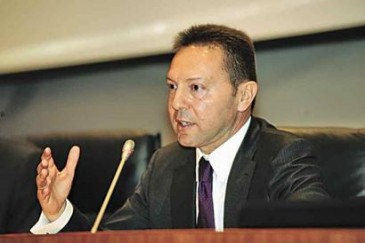Greek ministers delivered a staunch defence of their efforts to put the economy back on track on Wednesday and said they did not want any more conditional loans from the EU or IMF, although leeway would be helpful. Meeting Brussels-based journalists on a visit to Athens as Greece takes over the presidency of the EU, Foreign Minister Evangelos Venizelos and Finance Minister Yannis Stournaras emphasised early signs of economic recovery while treading carefully around the issue of debt relief or renegotiation.
"No other country during peacetime has achieved as much as Greece has achieved since 2009," Stournaras said when asked what specific steps he had taken to overhaul the economy and make it competitive again after six years of debilitating recession. "People should this year begin to feel the impact in their pockets and in their everyday lives."
Asked repeatedly if it was not essential for Greece to write off or renegotiate some portion of the 240 billion euros ($327 billion) loaned by the European Union and International Monetary Fund if it was to have any chance at a sustained recovery, both Venizelos and Stournaras demurred.
Venizelos, a combative former finance minister and Socialist party leader, said Greece had made no request for a "haircut" or reduction in the value of its loans and was only interested in how to make the outstanding pile more manageable. "We want a serious technical discussion about how to make the debt sustainable in the long term," he said, adding that to this point none of the loans had cost European taxpayers a cent because all obligations had been paid in full. Instead, Stournaras said there was room to lower the interest rates on the loans still further – even though they are barely above the cost of financing – as well as making changes to the pay-back schedule and using EU development funds in more imaginative ways to keep Greece solvent and on a recovery path.
"A reduction in the interest rate and a pushing back of the amortisation schedule is more effective from the point of view of the financial markets," he said, dismissing suggestions that what Greece ultimately needed was debt relief.
He also side-stepped the possibility of a further loan from the EU and IMF, despite growing expectations that it will be necessary, with discussions possible later this year. Any new loan would likely come with further strict conditions on spending cuts and tax increases that Greece is determined to avoid, not least to avert further social unrest.
"There can be no more fiscal conditionality," the finance minister said, highlighting the dire impact earlier rounds of spending cuts, state salary reductions and tax increases had had on the economy and domestic spending. "It's quite illogical to impose any more conditionality. It's totally self-defeating at this stage."
Over the past four years, Greece has forced through a 22 percent reduction in the minimum wage, cut average public sector salaries by nearly a quarter and slashed some pensions by more than 40 percent, delivering a deep "internal devaluation". While the economy has contracted by almost 25 percent from its peak, following six consecutive years of recession, the current account deficit has been erased, exports have begun to pick up and growth of 0.6 percent is scheduled this year. Unemployment has stabilised, albeit at a painful 27 percent.









